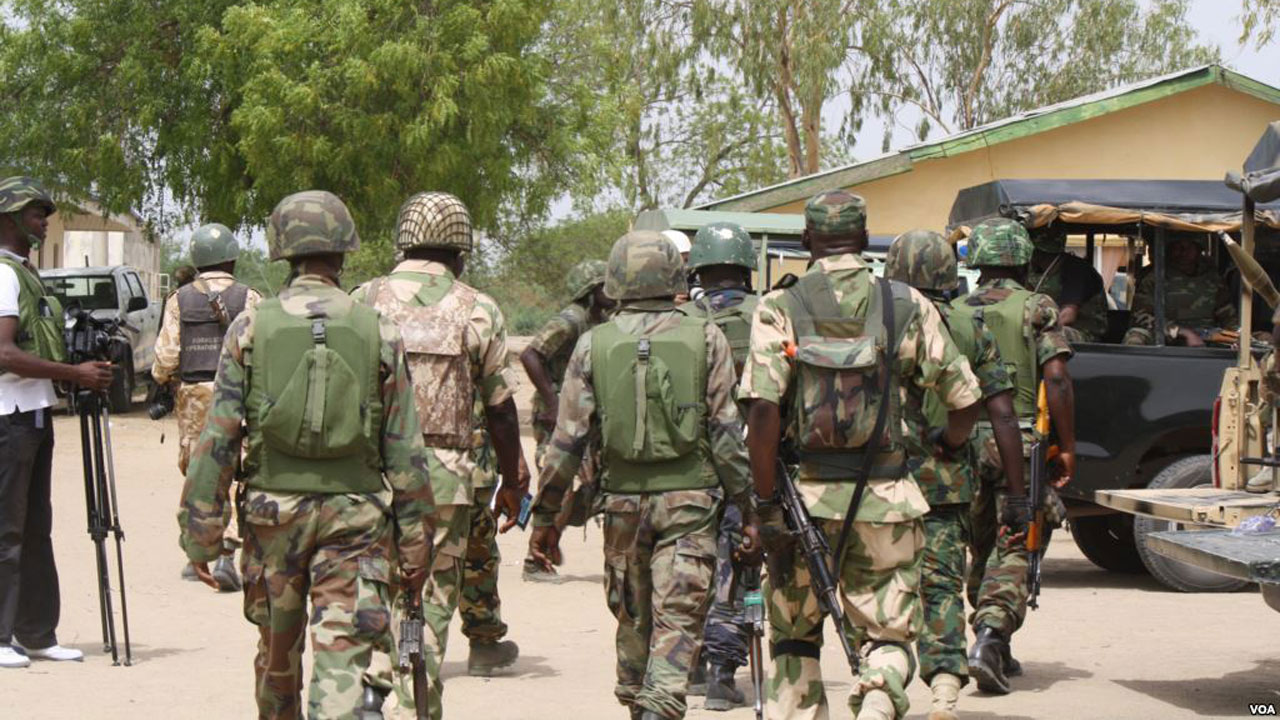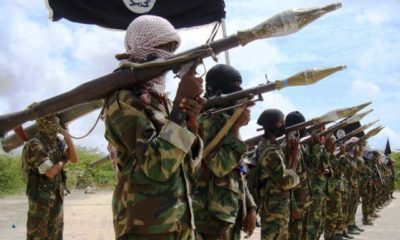News
Troops Kill Over 100 Boko Haram Terrorists In Borno

Troops of the Nigerian military under Operation Lafiya Dole have killed over 100 Boko Haram Terrorists in various encounters described by the Nigerian Army as aggressive clearance operation. The clearance operation, according to the director of Army Public Relations, Brigadier General Sani Usman, is part of efforts put in place to wipe out the remnants of the insurgents from their hideouts and crossing points. Usman said the frontline troops who are in renewed positive fighting spirit across the theatre to stop incursions and annihilate the terrorists also recovered various calibre of arms and ammunition in areas around Goniri in Yobe State, Damasak, Kross Kauwa and Monguno, among other locations in Borno State. “Specifically, the 120 Battalion and the newly formed Nigerian Army Special Forces Command have neutralised over 100 Boko Haram terrorists in various encounters,” he said. He added that the Nigerian Air Force (NAF) Air Task Force (ATF) component of Operation Lafiya Dole have been giving close air support to ground troops and also facilitating hot pursuit of fleeing infiltrating terrorists in the ongoing operations. The Army spokesman hinted that the Air Task Force has destroyed several Boko Haram terrorists’ gun trucks and facilities, while providing support to the ground troops. He further revealed that the gallant troops have also been repelling attempted efforts by the terrorists to infiltrate their locations. The battle, Usman said, has now been further shifted to the fringes of Lake Chad and other suspected Boko Haram terrorists enclave along the borders. PMB Restates Commitment To Equipping Military Meanwhile, President Muhammadu Buhari yesterday restated his administration’s unwavering commitment to equipping the military to overcome the Boko Haram insurgents in the North East. The president who spoke when a delegation from Borno led by the state governor, Kashim Shettima, visited him at the presidential villa noted that the collective safety and security of civilians would continue to remain paramount in the administration’s strategy to restore peace and stability in the North East region. ‘‘Having been a former governor in the North East, a GOC in the region and very familiar with the terrain, I assure you that as Commander-in-Chief, I’ll raise the standard of the Nigerian Armed Forces and get the resources to encourage them to do better than what they are doing”, Buhari said. The president told the delegation comprising political, traditional, religious, women and media leaders in the state that he is impressed by their leadership roles and participation in helping the government deal with insurgency in the North East. He also commended the contributions of the stakeholders from Borno State, particularly on the need for more air support for ground troops and coordination among different security agencies. ‘‘I am getting at least a weekly situation report from the services and of course from other sources. I encourage the commanders to remain committed”, a statement from presidential spokesman, Femi Adesina, quoted the president as saying. President Buhari thanked Governor Shettima for demonstrating leadership in the state during these difficult times. “I have an idea how much you are doing and I very much appreciate it. I’m sure that has earned you more respect from the people,’’ he told the govetrnor. Earlier in his remarks, Governor Shettima recounted how before 2015, Boko Haram had almost completely overrun the state, occupying many local government areas because the state government did not receive the necessary support and succour from the then federal government. On behalf of the people of Borno, the delegation presented a letter containing security-related observations and ten undisclosed demands to President Buhari. The demands are connected to measures the delegation said if granted by the president would help in efforts to end the Boko Haram insurgency in the state. Governor Shettima said the demands and observations are the outcome of an extraordinary security meeting which he convened in Maiduguri last week Monday. Informing Buhari that he was presenting a letter on behalf of the delegation, he told journalists that because there were matters of security, he was not going to disclose both demands and observations. He also said the delegation would discuss the issues raised in closed door meeting with the president. The governor told the president, “Your Excellency, we came with some observations and 10 specific requests for urgent presidential intervention. These observations and requests are products of discussions in the aftermath of our extraordinary security meeting held one week ago. We didn’t rush to come after the meeting. We felt the need to travel to Northern Borno, interact with displaced persons and the military so as to strengthen public confidence. “I will seek the understanding of journalists by not making public any of our observations and 10 requests. They are matters of security, which we hope to discuss with Mr President in closed door. I will like to recall with profound gratitude that in our extraordinary meeting last week, we brought on board leadership of the Nigerian Union of Journalists in Borno State and we took them into confidence. “True to their promise, none of what we discussed in that meeting was revealed through any media platform. Such an attitude displayed by the media is a further proof that Nigerian journalists are, without doubt, devoted to sincere measures in the fight against Boko Haram”. The governor also explained that the people of Borno State have demonstrated the highest commitment to the fight against Boko Haram by donating their sons and daughters who have been fighting in battle fronts as volunteers under the Civilian JTF. He continued: “Mr President, from 2013 to date, more than 20,000 youth volunteers, amongst them young women, have offered themselves in fighting Boko Haram under the Civilian JTF. “These youths are sons and daughters of the same people of Borno State that were accused of undermining the fight against Boko Haram. From 2013 to date, our administration has been solely responsible for funding hundreds of successful operations carried out by the Civilian JTF. “We have been responsible for their recruitment after thorough vetting by the DSS. We fund their training, kit them, provide them operational vehicles and maintain these vehicles. We pay their allowances, supply them surveillance gadgets and we deploy them on the advice of security establishments. “Most importantly, these (members of) Civilian JTF are good in gathering local intelligence and they are experts in identifying Boko Haram members no matter how they try to conceal themselves. They have done so much with our consistent support and we seriously have supported and continue to support all security agencies, particularly the military”. He recalled that a delegation in Borno State was in the villa because unlike in previous years when they were treated with suspicion, President Buhari has demonstrated empathy and compassion to Borno people. The governor said, “Mr President,Sir, the purpose for which we are here comes with one irony. Borno state suffered its worst times between 2013 and 2014. In that period, Boko Haram abducted our children, attacked and took firm control of 20 out of the 27 local government areas of Borno. “In these 20 local government areas, they established caliphates and put in place, sovereign administrators who strictly enforced tax systems and violent laws. “They abused our young daughters. They forced young men to join their fighters. They turned old men women into domestic slaves and they publicly executed parents in the presence of their own children and wives for allegedly offending laws that are even alien to the religion of Islam. “While administering our 20 local government areas, Boko Haram operated from council local secretariats in headquarters of local government areas and lived in palaces of traditional rulers, military barracks and police stations. “On the other hand, from 2015 to 2018, the Nigerian military with you as commander-in-chief was able to liberate all the 20 local government areas hitherto under the Boko Haram. The military even took control of Boko Haram’s main operational base in the Sambisa forest. With these successes, the Borno State government was able to rebuild more than 30,000 homes in various communities with all public facilities restored. “With Mr President’s leadership, many of our hitherto displaced brothers and sisters, including some of our traditional rulers, voluntarily returned to rebuild communities in 14 local government areas, including Bama. Mr President, I recollected all these for the sole purpose of establishing the irony in our visit today. “Mr President, the truth is that in the past we were regarded as the problems rather than the victims. Government, elders and the people of Borno State were seen as undermining the war on Boko Haram. We were treated with suspicion”. Other stakeholders from the state who made comments included chairman, Christian Association of Nigeria (CAN), Borno State chapter, Bishop Mohammed Naga; secretary of Borno Elders’ Forum, Dr Bulama Mali Gubio; former governor of the state, Maina Ma’aji Lawal; Emir of Dikwa, Muhammad Masta II bn Al-Amin El-Kanemi, representing the Shehu of Borno; Senator representing Borno North, Abubakar Kyari and leader of Borno caucus in the National Assembly, Senator Ali Ndume.




















